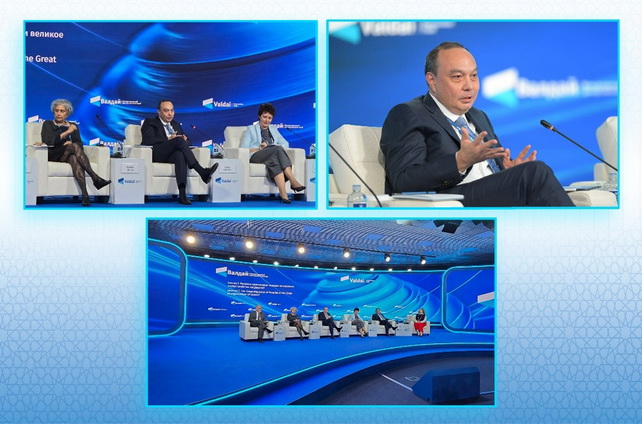
Eldor Aripov States That “Every 25th Person on the Planet Lives and Works Outside Their Country”
Eldor Aripov States That “Every 25th Person on the Planet Lives and Works Outside Their Country”
Tashkent, Uzbekistan (UzDaily.com) — A delegation from Uzbekistan, led by Eldor Aripov, Director of the Institute for Strategic and Interregional Studies under the President of the Republic of Uzbekistan (ISMI), is participating in the 22nd annual session of the Valdai International Discussion Club, held in Sochi from 29 September to 2 October. The forum’s theme is “A Polycentric World: Instructions for Use.”
Speaking at the session titled “The Great Migration of Peoples or the Great Reorganization of States?”, Aripov emphasized that migration increasingly reflects global socio-economic processes and has become a natural part of contemporary development. He noted that, according to UN data, every 25th person on the planet lives and works outside their home country.
The ISMI director highlighted asymmetrical demographic trends in the Eurasian region. Some countries face challenges related to population aging and a decreasing share of working-age citizens, while others demonstrate stable population growth and the mass entry of young people into the labor market. These contrasting trends create conditions for mutual demographic synergy, where the needs of some countries can be balanced by the potential of others.
Aripov stressed that the ability of states to exchange human capital is becoming a key factor in economic growth and international competitiveness. He cited examples: in Germany, migrants contribute approximately 5% of GDP, while in Canada, the figure reaches 16%.
He further noted that the total population of Central Asian countries has already exceeded 80 million, with around 65% under the age of 30. By 2050, the region’s population is projected to surpass 100 million, and the working-age population is expected to increase from 51 to 70 million. In Uzbekistan, the average age is just 28 years, and 650,000 to 700,000 young people enter the labor market annually. “This is not just dry statistics, but a portrait of the future,” Aripov emphasized, adding that national policy aims to turn demographic potential into a driver of economic growth.
He outlined three key directions of Uzbekistan’s strategy.
First, investment in human capital remains a priority. Over the past decade, preschool education coverage has nearly tripled, from 27% to 74%, and higher education enrollment has grown more than fivefold, from 9% to 46%. The number of universities has surpassed 220, including 35 branches of foreign institutions, raising academic standards. Special focus is given to STEM education, with over 500,000 schoolchildren engaged in advanced mathematics, informatics, and robotics. The education system is gradually adapting to the demands of the digital era. According to World Bank data cited by Aripov, the digital literacy of Uzbek youth is already comparable to that of Eastern European countries.
Second, Uzbekistan is actively promoting “virtual migration,” allowing citizens to work for global markets while remaining in their home country. More than 15 IT parks currently operate in the country, employing over 3,000 residents, with around 35 new registrations monthly. Digital services exports have already exceeded $900 million and are projected to reach $5 billion by 2030. Young people are the main driving force behind technological growth, with one in three startups founded by individuals under 30. This trend signifies a structural shift in the economy toward entrepreneurship and innovation.
Third, Uzbekistan emphasizes a model of circular migration. The country is creating conditions for citizens to work abroad legally, gain professional experience, and apply it to national development. Tax and financial incentives are provided to returning migrants. In 2024 alone, over 700,000 labor migrants returned to the country. Simultaneously, efforts are being made to improve the quality of labor migration, with more Uzbeks choosing countries with high employment standards. The government has established centers that have trained over 150,000 people and launched digital platforms, including SkillsUz, for verifying migrant qualifications. In 2024, more than 10,000 citizens were officially employed in the EU, Saudi Arabia, and Qatar, while agreements on labor mobility have been signed with Germany, and professional and language training programs are underway with South Korea and Japan for work in agriculture, logistics, and technology sectors.
Aripov concluded by stressing the need to rethink migration. “It can no longer be considered merely as a tool for short-term labor shortages; it has become a systemic foundation for economic and societal transformation, a strategic asset for national development, and an important element of regional and international cooperation,” he said. He cautioned that unilateral restrictions and controls would push labor flows into the shadows and undermine trust between states. He called for joint standards, transparent mechanisms, and flexible agreements to ensure mutually beneficial conditions for sending and receiving countries, as well as for migrants themselves.
The forum, organized by the Valdai Club, the Council for Foreign and Defense Policy, the Russian International Affairs Council, MGIMO, and the Higher School of Economics, brought together over 140 experts from 42 countries across Europe, Asia, Africa, the Middle East, the Americas, and Central Asia. High-profile guests and speakers included Russian Foreign Minister Sergey Lavrov, Deputy Head of the Russian Presidential Administration Maxim Oreshkin, Deputy Prime Minister Alexander Novak, and Moscow Mayor Sergey Sobyanin.